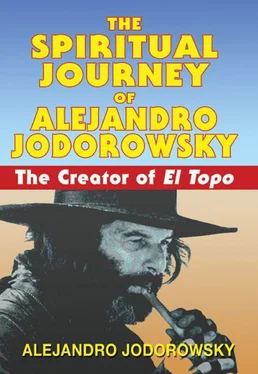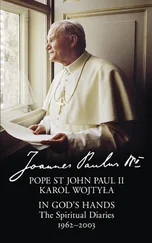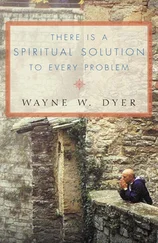Here I had to stop. “This is a trick, Ejo! In asking me where the master has gone, you underestimate me. We do not ‘go’ anywhere, we are not the self-image that we fabricate. There is no actor who moves with respect to a spectator. Unity excludes all duality, all change of place.”
Ejo slapped the palm of his hand with his fan. “Bravo! You remind me of a giant steamroller, demolishing the problem. But what do you say right now?” And suddenly he twisted my nose as he asked the last question. I cried out in pain and pushed him away, offended. He looked at me mockingly. “If there is no individual existence, who is it that just cried out and pushed me away?”
He must have known that I had not yet attained a level that would enable me to answer this question, for he did not wait for my reply.
“The first point is this: in your long explanation with all those details, you adopted a position of master yourself and spoke to me as to a student. There’s a good illustration of vanity! The second point is that you fell into the trap of idealizing the counselor. You described him as a perfect master who was able to nullify the magus’s powers. In our little book, when the disciple is asked where the master is, he exclaims: ‘What a pathetic incompetent!’ After this there follows a commentary that may well puzzle you: ‘When Etchu was twice discovered by Daiji, he was totally overcome by hatred.’ In your version, you made the mistake of supposing that the magus was able to read the thoughts that the counselor deliberately allowed him to read in order to expose him. Yet the commentary suggests that in the first two questions, Etchu was possessed by his role of mentor to the emperor. He was not truly himself and was instead identified by his official role of testing Daiji’s claims. The first reply came as a surprise and a blow to his pride. He was offended, which enabled Daiji to humiliate him a second time. Only with the third reply did he perceive his error. He then let go of his identification with his role and his desire to please the emperor, abandoning all his official self-importance to become simply Etchu again. This put him in a state of no mind. But this is not some sort of total disappearance. Instead, it is a detachment from past and future to enable him to be only in the mind of the present moment. . If it is warm, it is warm; if it is cold, it is cold. The mind does not create any problem beyond the here and now. It responds with absolute immediacy. This does not exclude any sensation of discomfort due to heat or cold, but the mind does not linger on such sensations any longer than the sensation lasts. Do you understand? Now — twist my nose!”
Awkwardly (his nose was rather small), I obliged him. He yelped with pain and jumped back. Then he grinned without the slightest reproach.
“When I feel pain, my mind knows pain. When the pain ends, there is no more pain in my mind. Etchu was insulted by the student because he insulted the magus. In calling him a ‘poor fox,’ he fell back into his official role, attempting to deny Daiji’s powers. Once more, he was overcome by hatred. What a pathetic incompetent! We should be grateful to those who put us in an embarrassing situation that exposes our weaknesses, for it offers us an opportunity to come closer to who we really are. Now tell me very quickly: What is the foremost weakness?”
Like all of Ejo’s sudden questions that come like a gunshot just at a time when my mind, absorbed by other thoughts, was not expecting it, this one disconcerted me. I had the sensation of falling from a dreamlike summit toward the hard ground of reality. Before me, I saw several levels of weaknesses: moral, physical, sexual, emotional — an avalanche of obstacles seemed to descend upon me, and I felt a weakness in my very essence. Who can claim to be strong when confronted with the inevitability of death? In a tiny voice, I answered: “My greatest weakness is being born.”
I will never be able to describe the look Ejo gave me then. It lasted only a fraction of a second, but it reduced me to dust. The depth of my ignorance was revealed to me. Yet instead of acknowledging this revelation, as Etchu did, I immediately fell into anger. I felt like punching him right in his cobralike eyes.
Untroubled and speaking with great tenderness, as if to a child, he whispered: “What a pathetic incompetent!”
Suddenly, I felt I understood the koan. In my very bones I felt what Etchu had experienced. I subdued my anger, joined my palms, and bowed my head.
“Thank you, Sensei.”
“Don’t bow yet, we haven’t gone deeply enough! Here is a koan that is capable of throwing you into the real abyss. Listen: In a temple in Kyoto, why is there a cat in the painting depicting the Buddha’s entrance into nirvana?”
I answered with a long string of questions. “Is the cat in nirvana? Is the cat the Buddha’s companion? Does the cat come there alone and find the Buddha there? Perhaps the cat is an answer to Joshu’s koan: ‘Yes, the cat has Buddha nature’? Or is it a symbol? Felines see in the dark; they hunt at night. The Buddha saw in the dark night of the soul, saw through all the mysteries, but if he is depicted as entering nirvana, it means he is not there yet. Perhaps the cat symbolizes the Buddha’s animal nature, which is not yet overcome. When the cat disappears, the Buddha will dwell forever in the center of nirvana. Or perhaps the opposite is the answer: the true Buddha is the cat, the animal nature, and the Buddha is one of its dreams. Does that mean that there is no spiritual Buddha, that what really awakens is our body when we see that we are simply animals?”
Ejo gasped for air as if suffocating, fanning himself rapidly. “What a torrent of words — sake ravings! Close your mouth in silence and listen now to the good disciple’s answer to the master as recorded in our secret book: ‘Why is there no mouse here? And why do you not have a wife?’ This disciple does not fall into the trap of drowning himself in speculations, as you do. And why is there no mouse? Why not a monk with a crane’s head, a white horse being eaten by nuns, or a heart with four legs of fire, or a mountain of dung giving birth to butterflies? And why do you have no wife, no thousand-pound spider, no mother who flies against the wind? Simply: There is a cat in the painting because the painter painted a cat! How many cats, Buddhas, and nirvanas are churning in your mind?”
My mouth was dry. I felt I could never speak another word without disgust. I took a zafu (a black meditation cushion), went upstairs, and sat in the center of the terrace, legs crossed and palms open to the sky, waiting for the dawn to break. I wished for this clear light to cleanse my mind of everything that encumbered my memory. I had a vision of the illusory Tocopilla perched upon the rock, overcome by heat, parched with thirst, squeezed between the sea and the Chilean Cordillera, with its municipal library, about forty square yards of walls covered with bookshelves, the place where I had spent my childhood, friendless, lacking parental affection, reading anything and everything to fill my solitude — my first nirvana, which had pursued me all my life. I voyaged here and there — Santiago, Paris, Mexico City — always hauling boxes with tons of books, re-creating the nostalgic space of my childhood. And the interiors of empty theaters were another nirvana — vacant seats, empty stages, a small service lamp casting a dim light with a grave silence that could have been plundered from a temple, a total break from the miseries of the world. This was also a personal territory, a private palace, a nirvana that became filled with male and female cats when the play began. Capricious actresses, egomaniacal divas, jealous critics, thieving unions, corrupt officials: I had sought them out, seduced them, provoked them, brought them into my life because I wanted to become a famous artist — and then a seductive, revered sage. It was shadows pursuing shadows, the desire to attain the summits of renown so that they would look at me without frowning, so that they would give me prizes, so that the master would declare me a roshi, so that God himself would enter me through my navel and fertilize me, so that I would give birth someday to a perfect mind. . In sum, this was how I saw myself in my whole life up to this moment: a painter of Buddhas and cats entering perpetually into an inaccessible nirvana and never arriving at its center!
Читать дальше












